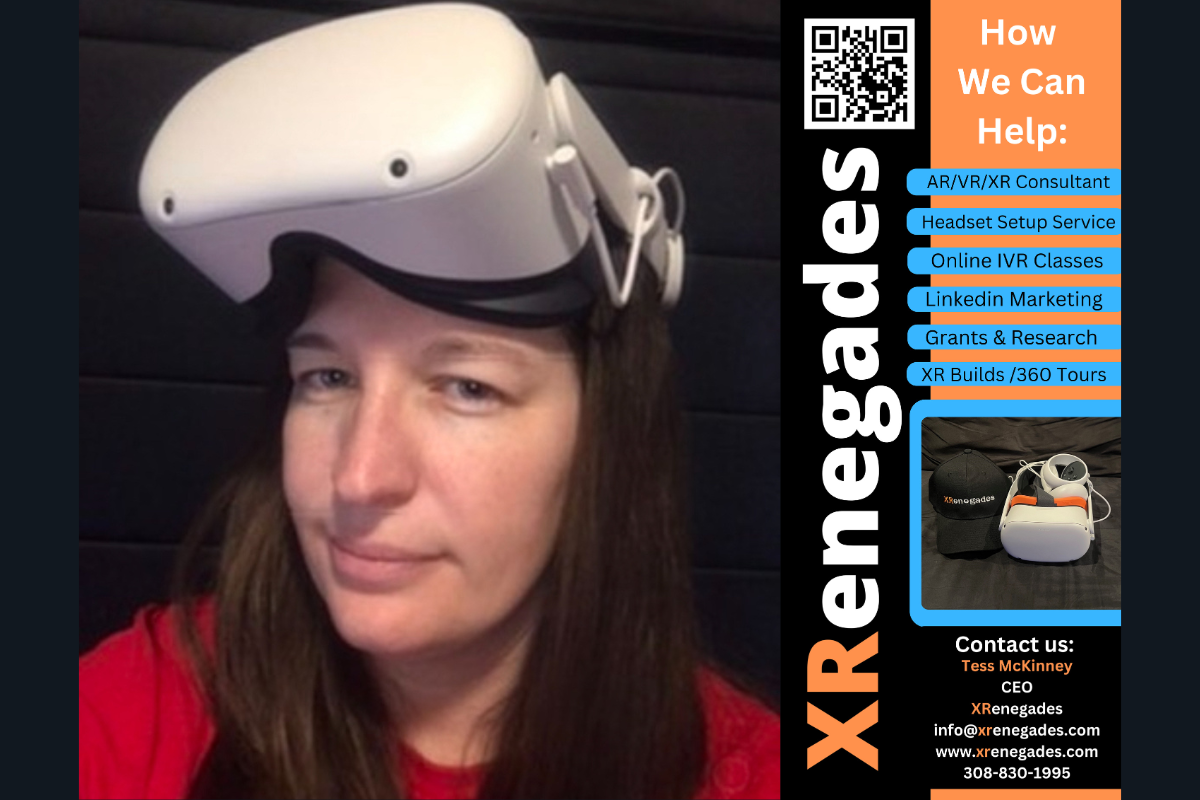XRenegades Brings the Benefits of Immersive Technologies To a Growing List of Healthcare Clients, Communities
- published: 2025/01/06
- contact: NBDC Communications - Nebraska Business Development Center
- phone: 402.554.6256
- email: kjefferson@unomaha.edu
- search keywords:
- NBDC
- Nebraska Business Development Center
- XRenegades
- Nebraska Entrepreneur
- SBIR

Eagle – One of Tess McKinney’s focuses as founder and CEO of XRenegades is immersive virtual reality (IVR), and her skills and success are providing very real benefits to her clients and the schools her company supports through donated IVR headsets and the time she volunteers installing educational software.
Based in Eagle, Neb., XRenegades, a nod to the field of Extended Reality (XR), is a subsidiary of Firework Media Studio, LLC, which McKinney founded 18 years ago.
XRenegades provides consulting services, technical setup, and implementation and training in immersive technologies including XR, Augmented Reality (AR) and Artificial Intelligence (AI). The work includes XR lab development for educational and healthcare institutions, hardware and software selection, ongoing support, and assistance in identifying and securing grants and funding.
The idea for XRenegades was sparked by a fusion of technology and creativity. With a degree in Information Technology (IT) and a passion for graphics inspired by her mother, an art teacher, McKinney’s journey took a pivotal turn while working at Southeast Community College. Curious about immersive media, she purchased a 360-degree camera on Amazon for $50 and created a 360-degree video showcasing the college’s agriculture area. Sharing her video at the Nebraska Education Technology Association (NETA) conference, McKinney introduced a way to merge education and technology.
After leaving Southeast Community College, McKinney went to work at the University of Nebraska Medical Center (UNMC) College of Nursing-Lincoln campus, where she contributed to advancing educational initiatives with immersive technologies. “That experience really exposed me to IVR and other emerging technologies,” she says. While there, she collaborated on projects that utilized IVR for nursing education, helping students engage with realistic simulations that prepared them for real-world scenarios in patient care.
McKinney also produced technologies for the Centers for Disease Control (CDC) while working at the UNMC Global Center for Health Security. She is a contract consultant for Nebraska Medicine, where she provides technical support for building a remote virtual consultation platform and for an IVR project regarding infection prevention. And, she has a contract for XR implementation at the University of Texas Health in San Antonio, at its School of Nursing and College of Dentistry.
The XRenegades website features a directory of more than 170 companies specializing in XR simulation for healthcare. The directory, which has grown in eight years from its original six companies, is publicly accessible as a valuable resource to learn about XR innovations in healthcare.
“IVR training saves time and money, for public healthcare institutions and for the taxpayers who support them,” she says. “IVR as an educational tool costs 10 times less than implementing mannequin simulation, and mannequins don’t interact with you or talk with you. For students just starting out, IVR helps them see things better than with a mannequin, like how to identify a specific condition or disease.
“With IVR, you don’t have the cost of things like disposable gloves, wipes or fake blood,” she says. “And, if a mannequin fails, it can be out for repairs for an extended period of time. If an IVR headset fails, you can replace it immediately for about $400.”
IVR training saves time and money, for public healthcare institutions and for the taxpayers who support them
As her company has grown, McKinney has relied upon the advice of the consultants at the Nebraska Business Development Center (NBDC), and Josh Nichol-Caddy, director of the NBDC Innovation and Technology Program.
“The NBDC is a fantastic resource,” she says. “I founded a tech company, but no one taught me how to run a small business. The NBDC has helped me organize a business plan, apply for Small Business Innovation Research (SBIR) and Nebraska Department of Economic Development grants, complete my SAM (System for Awards Management) registration, and work toward my woman-owned business certification.”
McKinney believes it is important to integrate IT education and emerging technologies into schools, especially rural schools that may lack funding for such programs. To help achieve those goals, for every 25 IVR headsets she sets up for her clients, she donates one to a Nebraska school, and volunteers her time to set up the necessary educational software.
“We’ve given away more than 15 headsets so far, and then worked to help the schools get grants for additional headsets,” she says. “The communities are seeing the impact, and are now working to secure donations for more headsets.”
McKinney says IVR tools can better prepare students for careers such as the trades. “Many high schools can’t afford welding equipment, for example,” she says. “But with IVR, the students can learn the basics so by the time they get to college or a trade school, they know what to do. There are apps that cover multiple trades, and the integrated software can offer even more trades.
“IVR is revolutionizing education by breaking down barriers to learning and creating hands-on experiences that were once impossible to achieve in traditional classrooms,” she says. “It’s not just about technology; it’s about empowering students to explore, engage and excel in ways that truly prepare them for the future.”